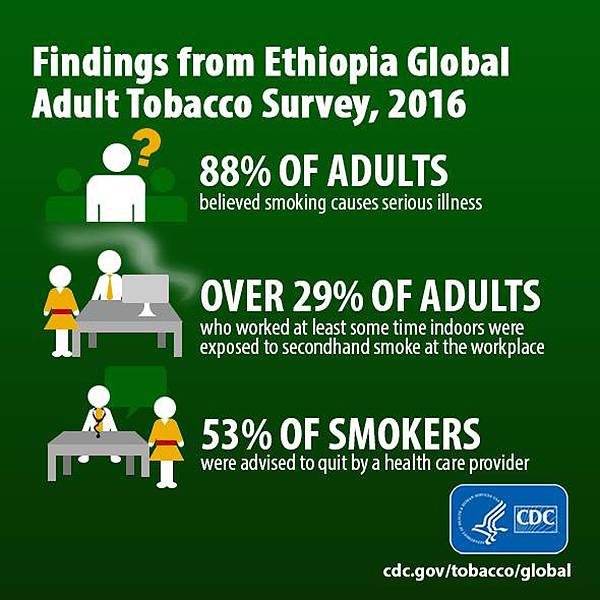You are here
Action Is Needed to Keep Smoking Rates Low in Ethiopia
Tobacco use is the leading cause of preventable death and disease in the world, resulting in approximately 7 million deaths annually. While tobacco use in sub-Saharan Africa remains relatively low, consumption is rising as tobacco companies seek new markets for their products and seek to grow their consumer base. The relatively low prevalence of tobacco use in sub-Saharan Africa presents a unique opportunity to curb the tobacco epidemic in the region and prevent the harmful consequences of tobacco use. To better understand the scope and nature of the tobacco use epidemic, the CDC Foundation is partnering with the Centers for Disease Control and Prevention (CDC), the World Health Organization (WHO) and global partners to implement the Global Adult Tobacco Survey (GATS).
In the African region, GATS is supported by a grant from the Bill & Melinda Gates Foundation. The four-year grant aims to build and enhance tobacco use surveillance and research capacity in sub-Saharan Africa, by producing nationally representative data to track tobacco use and trends across the region. As part of the grant, Ethiopia released their GATS results in late October.
According to GATS data, 3.2 million Ethiopians currently use tobacco. Tobacco use causes devastating health and economic consequences by killing up to half of all lifetime users. Results from the survey indicate that nearly one-third of adults who work indoors are exposed to secondhand smoke.
Currently the smoke-free law in Ethiopia provides for designated smoking areas in certain public places, despite evidence that such areas do not protect non-smokers from being exposed to the dangerous effects of secondhand smoke. There is no safe level of secondhand smoke which leads to diseases such as lung cancer, heart disease and respiratory disease. Additionally, cigarettes in Ethiopia remain affordable with a pack of cigarettes costing well below the equivalent of one U.S. dollar. Increasing tobacco prices through tax increases is the most effective method for reducing tobacco use, especially among youth and low-income families.
The government of Ethiopia is working to enact evidence-based policies to reduce tobacco use and save lives. Enacting and implementing policies outlined in the WHO MPOWER policy package will greatly serve efforts to reach Ethiopia’s goal of a 30 percent reduction in tobacco use by 2020.
The CDC Foundation is pleased to work with global partners to reduce the harmful consequences of tobacco use, and improve the health of people in sub-Saharan Africa.

